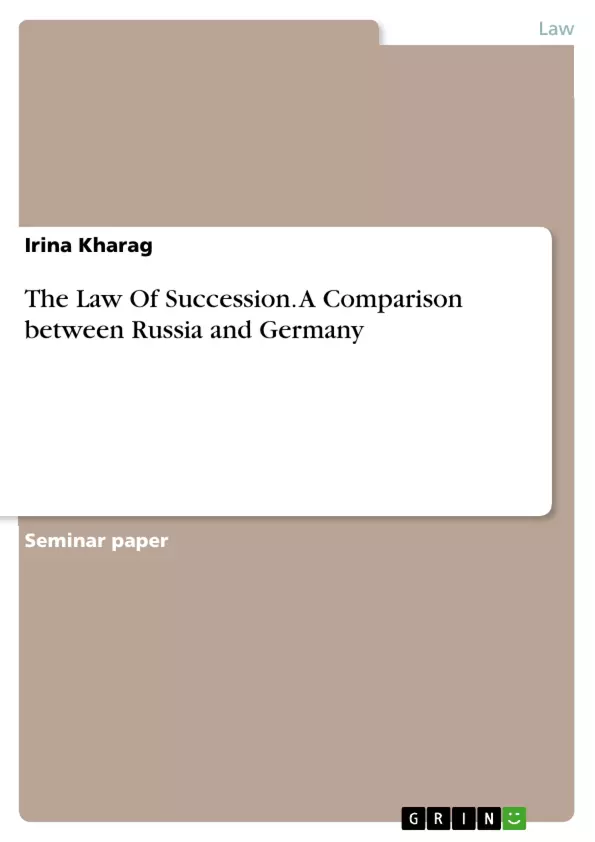This assignment deals with the law of succession in Russian Federation and Germany. The law of succession does not seem very interesting to the majority of the law students – and wrongly so! It is one of the oldest areas of law which roots go back almost to the Stone Age. It is based on the fundamental human right of property since it obviously does not exist in societies where the individual right to own and to transfer the ownership is not recognized by law or custom. In addition, this topic never stops being actual because nowadays almost everyone is confronted with it sooner or later by inheriting and/or bequeathing.
In case of Russia, we can additionally observe the particular situation of a state challenged to establish a new legal system after the collapse of the Soviet Union taking into account human rights in a relatively short period of time. The law of succession as part of legal order had also to be adapted to the new reality determined by the free market economy and developed rapidly.
Finally, Germany is one of the leading European countries with a very elaborated codification and broad scope of the judicial review whose example among others is bound to influence the Russian legal experts searching for time-tested patterns and trying to combine foreign experience with the peculiarities of the own country in order to create modern legislation.
In the following, we will overview the historic development of the law of inheritance both in Germany and Russia. After this, we will analyze the current legal situation in both countries, attempting to establish its relationship with the respective constitutional law as well as trying to show the similarities and find possible explanations for the differences. The conclusion will then summarize the findings obtained.
Inhaltsverzeichnis (Table of Contents)
- I. Introduction
- II. Historic Development
- 1) Germany
- 2) Russian Federation
- III. Current legal situation
- 1) Constitutional basis
- 2) Sub-constitutional regulations and discussion of selected aspects
- IV. Conclusion
Zielsetzung und Themenschwerpunkte (Objectives and Key Themes)
This assignment provides a comparative analysis of the law of succession in Russia and Germany. It examines the historical development of the law in both countries, investigates the current legal situation within the context of their respective constitutional frameworks, and explores similarities and differences between the two systems.
- Historical development of succession law in Russia and Germany
- Influence of Roman law and Germanic law on the legal concepts of inheritance
- Impact of changing societal norms and values on succession law
- Role of property rights and individual freedom in the context of inheritance
- Comparison of current legal frameworks for succession in Russia and Germany
Zusammenfassung der Kapitel (Chapter Summaries)
The first chapter, "Introduction," lays out the scope and purpose of the analysis, highlighting the significance of succession law and the specific challenges faced by Russia in developing a new legal system after the fall of the Soviet Union. The comparison with Germany is motivated by its well-established legal system and its potential influence on Russian legal experts.
Chapter II, "Historic Development," traces the evolution of succession law in Germany and Russia, starting with ancient Roman law and Germanic traditions. It explores the interplay of family interests, sovereign power, and individual rights in shaping the legal framework of inheritance. The chapter also examines the role of the Catholic Church in influencing succession law, particularly in Germany.
Schlüsselwörter (Keywords)
This comparative analysis explores the law of succession in Russia and Germany, focusing on historical development, constitutional foundations, and key differences between the two systems. Key themes include inheritance law, Roman law, Germanic law, property rights, individual freedom, legal system development, and comparative law.
Frequently Asked Questions
How does the law of succession differ between Russia and Germany?
The assignment explores similarities and differences rooted in their respective histories, with Germany having a long-established codification and Russia rapidly modernizing after the Soviet collapse.
What are the historical roots of German inheritance law?
German law is heavily influenced by ancient Roman law and Germanic traditions, balancing family interests with individual property rights over centuries.
What challenges did Russia face in establishing succession law after 1991?
Russia had to create a legal system that recognized private property and human rights in a very short period to adapt to a free-market economy.
Is the right to inherit a constitutional right?
Yes, the study examines the constitutional basis of property and inheritance rights in both the German and Russian legal frameworks.
Why is German law a model for Russian legal experts?
Germany's elaborated codification and time-tested patterns provide a reliable reference for creating modern legislation in countries undergoing legal transitions.
- Arbeit zitieren
- Irina Kharag (Autor:in), 2008, The Law Of Succession. A Comparison between Russia and Germany, München, GRIN Verlag, https://www.grin.com/document/138954



